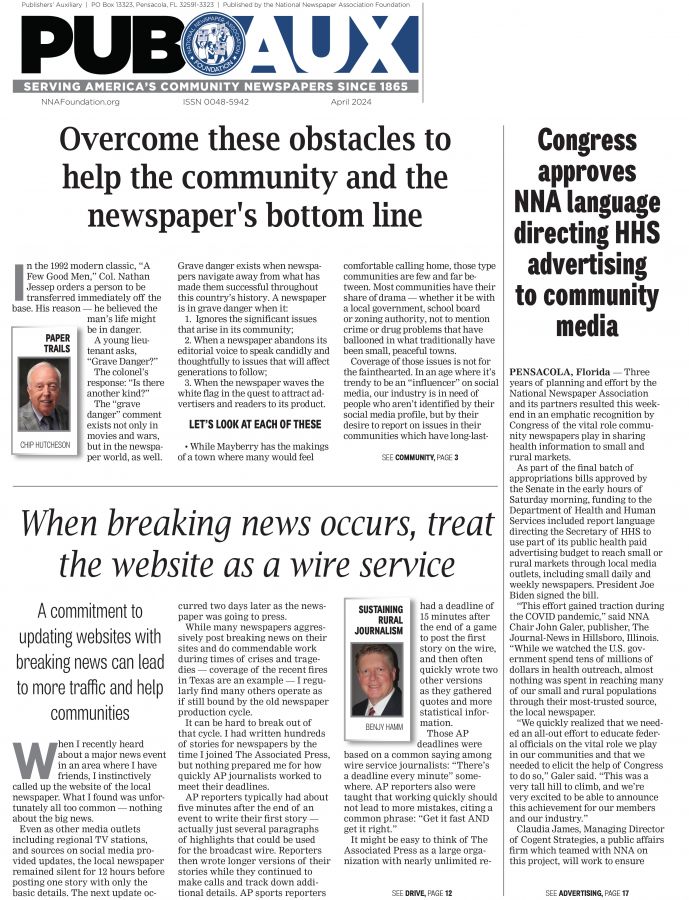Safe space for free speech
Mar 31, 2016
By Charles C. Haynes
Inside the First Amendment
When chalked graffiti promoting Donald Trump and his controversial wall appeared overnight on buildings, steps, and other surfaces at Emory University in Atlanta, Ga., last week, student reaction ranged from amusement to outrage.
A small band of some 40 students decided to protest what they viewed as messages designed to stir anger and promote intolerance on their campus.
As if to prove the students right, social media immediately lit up with vicious attacks on the protesters — some of whom were Latino — calling them names, and in some cases, issuing threats of violence.
Fox Sports and other media outlets piled on, characterizing the "offended" students as yet another example of "political correctness" gone wild. Some news stories falsely reported that the Emory administration was offering "emergency counseling" to the students in pain over the Trump graffiti.
In truth, protesting students were answering speech they found offensive with more speech, which is exactly what people are supposed to do in a society committed to freedom of expression. Rather than calling for censorship, the students were calling on the Emory community to stand with them against campaign rhetoric they viewed as harmful and dangerous.
"We are not scared of the chalk," the students said in a statement responding to the social media backlash against them. "We are not mad about being politically challenged. We are rightfully angry because we also exercise our First Amendment right to freedom of speech and there are people on this campus, and in this country, who as a result choose to threaten us and twist the truth to protect their own bigotry."
Freedom of speech is challenged and chilled when people speak out, only to be labeled "PC" by media and threatened by those who disagree with the content of their speech.
Freedom of speech is also harmed — it must be said — when anti-Trump protesters attempt to shout down Trump during his rallies, something that happens with disturbing regularity.
We all need, in our various ways, "safe spaces" — homes, houses of worship, gathering places on campuses — where we can openly and freely be who we are with people we know and trust. But in the larger public square of America, including common places we share on university campuses, we must have safe spaces for free speech.
When I was an Emory student back in the day, I helped organize peaceful protests on the same quadrangle where students gathered this month to protest the Trump graffiti. During one of those rallies, a groundskeeper who didn't like our anti-war message drove his lawnmower back and forth between the microphone and the crowd to drown out the speakers.
I didn't like the assault on my free speech then — and I don't like the assault on Donald Trump's free speech now.
No one has a "First Amendment right" to prevent crowds from hearing speakers at Trump events organized and paid for by the Trump campaign. And no one has a "First Amendment right" to threaten people who protest messages conveyed by pro-Trump graffiti.
Safe space for free speech requires reasonable restrictions preventing disruption, keeping the peace and protecting people from threats of violence.
More deeply, safe space for free speech requires a shared commitment to a modicum of civility. Speech that demonizes, ridicules and stirs hate may be protected speech — but it turns the public square into a hostile, sometimes violent arena.
The First Amendment, of course, does not mandate civility. But civil discourse — robust, but respectful exchange of ideas — is critical to sustain a free society that would remain free.
Charles C. Haynes is vice president of the Newseum Institute and founding director of the Religious Freedom Center. E-mail: chaynes@newseum.orgWeb: www.religiousfreedomcenter.org Twitter: @hayneschaynes.







